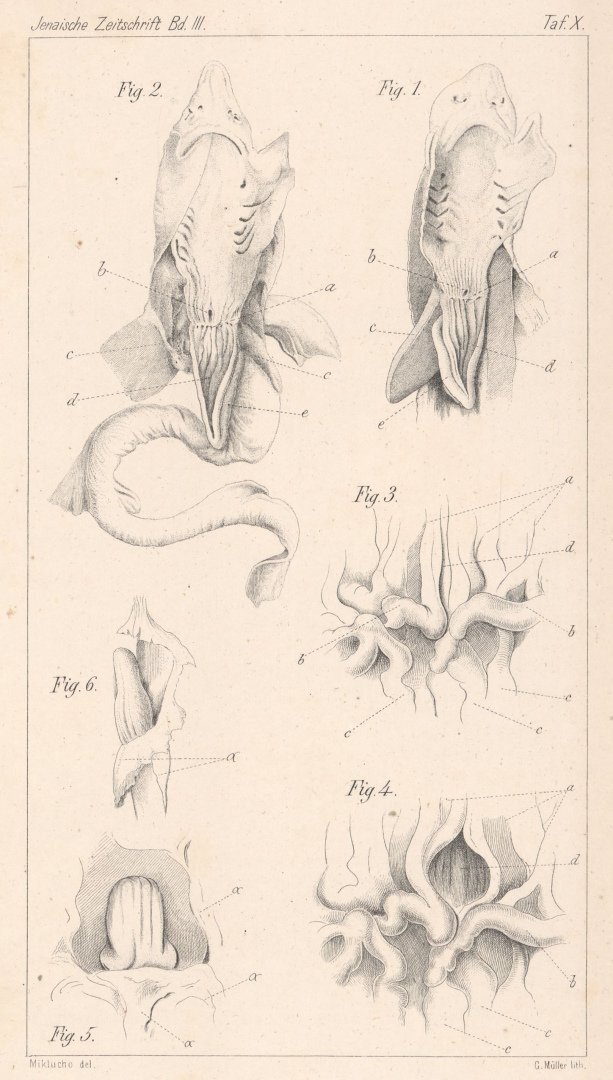
Do sharks have a swim bladder, like most fish, that helps them to swim freely in water? This question—which modern biologists can answer with a resounding »no«—sparked heated debates around 150 years ago. Researchers from the University of Jena and the Senckenberg Centre for Human Evolution and Palaeoenvironment (SHEP) at the University of Tübingen have now demonstrated just how enriching those discussions in the 19th century can be for modern research.
By Sebastian Hollstein
They have discovered letters exchanged between Charles Darwin and Ernst Haeckel, two pioneers of evolutionary research, dating back to 1868. The colleagues discussed in detail the possibility of a swim bladder rudiment in sharks. The correspondence between the two pioneers provides a first-hand perspective of the evolutionary research of that era. It has also inspired researchers today to critically examine the viewpoint of modern science. The leading role in the letters, however, is played by a less prominent junior colleague.
Haeckel excited; Darwin sceptical
A critical issue in their correspondence is the research conducted by Haeckel’s assistant at the time, Nikolai Nikolajewitsch Miklucho-Maclay. The Russian scientist, who later gained renown primarily through his work as an ethnologist, accompanied his tutor on a research trip to the Canary Islands in 1866. During his stay, he examined the brains of sharks and discovered, rather by chance, an evagination behind the branchial clefts, at the transition to the animal’s intestinal area.
Miklucho-Maclay interpreted this feature as a swim bladder rudiment, which must have been present in the ancestors of all vertebrates. Haeckel was excited by this discovery, as it confirmed his theory that sharks were the original vertebrates and gave rise to bony fish, lungfish and, later, land vertebrates. In this case, the swim bladder would be an evolutionary predecessor of the lungs.
Haeckel shared this discovery with his colleague, whom he revered. Darwin’s response, however, sent on 6 February 1868, was rather sceptical: »I do not quite understand what you tell me about his discovery in regard to the swim-bladder […].« As Darwin used the Russian nickname »Mikluska« rather than »Miklucho«, the connection to Haeckel’s assistant long remained hidden from the history of science.
Darwin had a different image of the interrelationships of vertebrates in his head, which contributed to the confusion. He believed that lungfish were the primordial fish from which all vertebrates—including cartilaginous fish, such as sharks—had developed. Darwin believed that the lungs were the original »gas organs«.
Haeckel, however, was largely correct in his version of the phylogenetic tree. Of course, sharks have also undergone certain changes since the first vertebrates appeared, so current sharks are not fully representative of the first sharks.
Yet, there was another point of contention: Darwin did not believe that the evagination discovered by Miklucho-Maclay was a swim bladder rudiment; instead, he thought that it was an undifferentiated structure from which a swim bladder could develop at some later evolutionary stage. Today, researchers broadly agree that Darwin was correct on this point.
»It is rare for two intellectual giants of any science to concern themselves with the research outcomes of an unknown, poverty-stricken student,« says Prof. Dr Uwe Hoßfeld of the University of Jena. Together with his colleague PD Dr Georgy S. Levit, Hoßfeld has been researching Miklucho-Maclay’s impact for several years. For him, this rediscovered passage is further evidence of the young Russian’s scientific legacy and the influence he exerted on the history of zoology—at the University of Jena and beyond—in only a few years of research before he died aged just 41.
Lungs or swim bladders—that is the question
So, what exactly had Haeckel’s assistant discovered? To illustrate this, Tübingen-based evolutionary biologist PD Dr Ingmar Werneburg has analysed cross-sections of shark embryos and can confirm the insights gained in the 100 years of research following the Darwin-Haeckel exchange. »Sharks and other fish breathe through gills, which are connected internally with gill pouches. Today, sharks commonly have five gill openings on either side. Their ancestors may have had more, which is why shark embryos today have some undifferentiated gill pouches as anlagen. They are only visible as small extensions that do not form into gills and instead only protrude to different sides,« says the zoologist. »Miklucho-Maclay found similar features in adult sharks.«
In the course of evolution, these embryonic anlagen have developed into lungs or swim bladders, researchers have concluded. The examination of the over 150-year-old letters caused the author team to reconsider why animals have only developed one of the two gas organs, and why there are no animals with both swim bladders and lungs. This might have to do with the available space within the body cavity, which is in turn determined by the animals’ living conditions.
»For example, fish that swim in open waters have a more vertical cross-section, which leaves more space in the upper part of their body where an unpaired swim bladder can expand, primarily performing a hydrostatic function,« says Ingmar Werneburg. »By contrast, fish that tend to live on the stony or vegetated bottom of shallow waters are more likely to develop a two-winged lung. Their fins tend to be positioned more sideward, which creates space within the fish for the formation of lateral respiratory organs from two of the lower embryonic protrusions.«
Drawings of a dissected shark by Miklucho-Maclay.
Picture: »Jenaische Zeitschrift für Medicin und Naturwissenschaft«Original publication:
Darwin, Haeckel, and the »Mikluskan gas organ theory«, Developmental Dynamics (2023), https://doi.org/10.1002/dvdy.661External link
Contact:
Am Steiger 3
07743 Jena Google Maps site planExternal link
